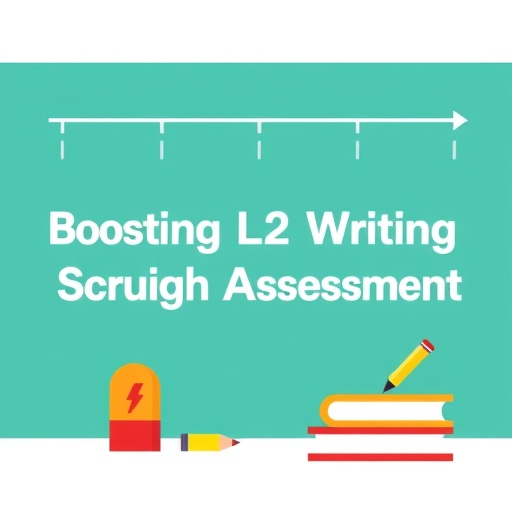In a contemporary educational landscape increasingly focused on equipping learners with critical thinking skills and a robust mastery of language, recent research has unveiled significant insights into the intersection of learning-oriented assessment and second language (L2) argumentative writing. According to a study by P. Imsa-ard, the implications of learning-oriented assessment practices on students’ writing abilities and their academic resilience are profound. The study, published in the journal Discov Educ, explores how structured feedback and assessment can empower students, especially in the realm of L2 communication, which is often riddled with challenges for non-native speakers.
The significance of effective writing in L2 contexts cannot be overstated. Writing serves not only as a means of communication but also as a critical indicator of academic proficiency. When students engage in argumentative writing, they are not merely practicing their language skills; they are also developing their ability to construct coherent arguments, engage with counterarguments, and persuade their audience. Imsa-ard’s research highlights that learning-oriented assessment fosters these skills by providing students with clarity about expectations and constructing a learning environment that prioritizes growth over mere grades.
One of the most intriguing findings of Imsa-ard’s research is the correlation between learning-oriented assessment and academic resilience. Academic resilience refers to the ability of students to bounce back from setbacks and persist in the face of challenges. The study found that students who received constructive feedback through learning-oriented assessments were better able to manage the stressors associated with L2 writing, thereby strengthening their resilience. This underscores the vital role that evaluation practices play in shaping students’ learning experiences and their ability to persevere academically.
In examining the methodologies employed in Imsa-ard’s study, it’s clear that a mixed-methods approach was adopted. Quantitative data obtained from writing assessments were complemented with qualitative feedback from student interviews. This dual perspective allowed for a richer understanding of how students perceive their abilities and the impact of assessment practices on their writing. This comprehensive approach validates the study’s findings while also paving the way for further research into best practices in L2 writing instruction.
Further, the research also offers practical implications for educators. Teachers are often tasked with the dual responsibility of assessing student performance while also fostering a supportive learning environment. Imsa-ard advocates for assessments that orient students toward learning rather than competition. Such assessments might include peer reviews, formative assessments, and ongoing feedback mechanisms, all designed to promote a culture of collaboration and mutual support among students.
The role of constructive feedback cannot be understated. According to Imsa-ard’s findings, students who received specific, targeted feedback were statistically more likely to improve their argumentative writing skills over time. This aligns with educational theories that emphasize the importance of feedback in the learning process. However, Imsa-ard warns against generic feedback, which often leaves students feeling discouraged and unsure of what steps to take next. By providing actionable feedback, educators can effectively guide students toward making measurable progress in their writing.
An equally important aspect of the study pertained to the emotional and psychological dimensions of learning. Academic pressure can be particularly intense for L2 learners, who often grapple with self-doubt and anxiety when producing written work. Imsa-ard’s research illustrates how positive reinforcement and a focus on continuous improvement can alleviate these pressures, thereby nurturing a healthier academic mindset. This approach is not only beneficial for students’ writing skills but is pivotal to their overall academic well-being.
Additionally, the study’s implications extend beyond the classroom. With increasing globalization, the demand for proficient writers in multiple languages is on the rise. As such, equipping students with the necessary skills to convey their arguments effectively in their second language is a vital educational priority. By integrating learning-oriented assessments into L2 writing curricula, educators have the opportunity to better prepare students for future challenges in a competitive global context.
Looking ahead, the research opens the door for further studies that might investigate the long-term impacts of learning-oriented assessments on L2 writing skills beyond academic contexts. Are students who thrive in writing during their formative years more likely to succeed in professional environments that demand effective communication? What interventions can further bolster the link between assessment and resilience? These are questions that deserve attention in future research endeavors.
Finally, Imsa-ard’s pioneering work encourages a critical re-evaluation of traditional assessment practices in education. It urges educators and policymakers alike to consider how they might reframe assessments to cultivate a more profound learning experience. As educational paradigms shift towards more learner-centered approaches, the insights from this study serve as a timely reminder of the potential that lies in harnessing the power of assessment to not only measure knowledge but to empower learners to thrive.
In conclusion, the intersection of learning-oriented assessment and L2 argumentative writing outlined in this study underscores the importance of effective educational practices. Emphasizing growth, resilience, and continuous feedback paves the way for students to realize their potential in writing, serving them both in their academic pursuits and their future careers as articulate communicators.
Subject of Research: The effects of learning-oriented assessment on L2 argumentative writing, writing ability, and academic resilience.
Article Title: Learning-oriented assessment and L2 argumentative writing: effects on writing ability and academic resilience.
Article References:
Imsa-ard, P. Learning-oriented assessment and L2 argumentative writing: effects on writing ability and academic resilience.
Discov Educ 4, 396 (2025). https://doi.org/10.1007/s44217-025-00779-x
Image Credits: AI Generated
DOI: 10.1007/s44217-025-00779-x
Keywords: Learning-oriented assessment, L2 argumentative writing, writing ability, academic resilience, constructive feedback, education.




